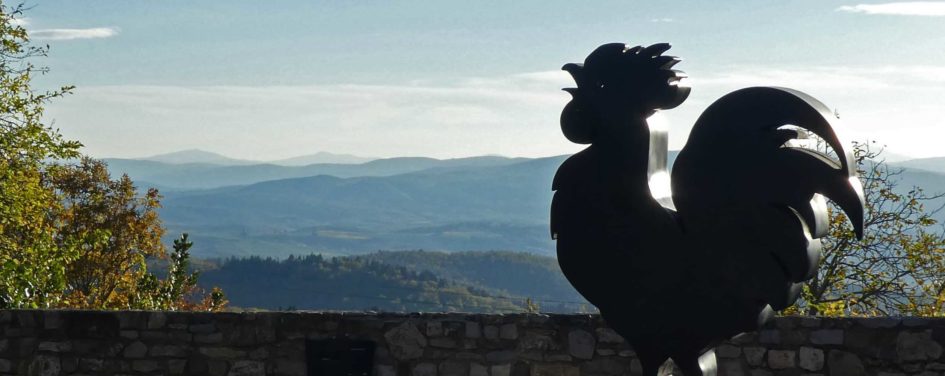In 1716 the boundaries of what was already this country’s premier wine making region were officially decreed. 300 years later the Chanti Classico area of Tuscany is regarded as the birthplace of modern Italian wine making. In reality though, wine has been produced on this land since Etruscan times, more than 2000 years ago.
Chianti Classico is a small region, about 700 square kilometres in total, extending from Florence in the north to Siena in the south. The landscape here is among the most beautiful – and the most photographed – in Italy.
There are very specific rules about what constitutes a Chianti Classico wine – for a start the wine must be 80% sangiovese, the typical grape of the region. But buyers can tell they’re drinking the real thing by the presence of the black rooster – the Gallo Nero – on the label.
Legend has it that in the 13th century the provinces of Florence and Siena decided to use a horse race to settle their long-running territorial dispute. The rules were that when the rooster crowed at dawn, a rider would set off from each city and their meeting point would mark the boundary of the provinces. The story goes that the Florentines chose a black rooster which they then kept in the dark for days.
When they released the rooster long before dawn on the appointed day it began crowing immediately, and the rider set off. The white rooster in Siena, meanwhile, crowed as usual at dawn. It’s said the Sienese rider covered only 20 kilometres before he was met by his opponent. The black rooster has been the symbol of Chianti since the 13th century and today it’s the mark of the Chianti Classico Consortium.
But there’s more to enjoy in this region than beautiful scenery and great wine; we also found wonderful history, fabulous food, lovely people and some of the prettiest towns we’ve seen so far – all good reasons for a return visit to the Chianti Classico.

11/29/2017 at 9:51 pm
I can’t wait to return to Chianti with Mum next year. Steven has a bike riding jersey with the Black Rooster on it from our last trip. It gets him out of bed and helps him ‘crow’ faster.
11/26/2017 at 12:46 am
Haha that’s a fantastic story! I can’t wait until we’re exploring Chianti next year! Ps. I’m glad we worked out what ‘Molino’ is 😂😘